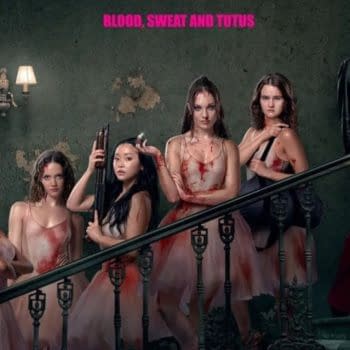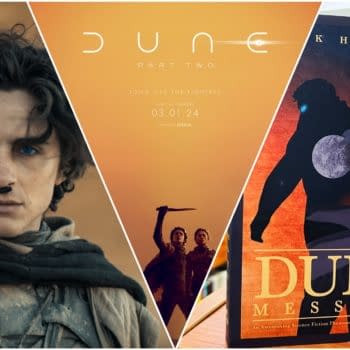Posted in: Movies, Recent Updates | Tagged: Chris Hood, entertainment, film, game of thrones, indie filmmaking, Post Production, quentin tarantino, Robin Hood Films
Film Schooling: Insider Insights On Indy Filmmaking – Post Production And Focus
By Chris Hood
(This is Part Twenty of an ongoing series to help educate aspiring filmmakers on the process of making their first film. Previous articles in this series can be found at BleedingCool.com and MovieIndustry.com)
Parts: 1, 2, 3, 4, 5, 6, 7, 8, 9, 10, 11, 12, 13, 14, 15, 16, 17, 18, 19
The previous article was about keeping your momentum going as you segue into post production. Now that you have a grasp as to the importance of that, know that your momentum has to go hand in hand with staying focused – which is the point of this latest rambling by yours truly. So, Ramblers, let's get rambling…
The key to staying focused as you enter post production is to know what needs to be done, in what order, and managing those things effectively and efficiently. Generally speaking, your list of "to do"s in the post process is relatively short, comprised of editing picture, finishing sound and securing distribution. Each of these has subsets and I'll be helping with some advice on these in the upcoming articles, but it is easy to lose focus even among a relatively short list of necessary tasks.
Part of the problem comes from the line between doing what you have to do and doing what you want to do and the inherent nature of waning enthusiasm about individual steps or even the project as a whole. Generally, editing is exciting in the early stages. Seeing the first cut of the film can be invigorating. After fifteen weeks in the editing room, it starts to feel like actual work. Watching the tenth cut of the film and making notes on editing changes which are more and more minor as you move forward, can also become tedious and unrewarding. After six months you'd probably rather have a carrot peeler taken to your testicles rather than sit in on another editing session. Too bad. It's part of the process (the tedium of editing, not the need to mutilate your nuts).
But it's easy to start shifting priorities away from where they need to be to where you wish they would or could be. Again, it comes down to focus. I've had a new cut of one of my films needing review and notes and been guilty of doing something more exciting. Now, this may or may not be related to the film, but this is another way post production can drag out for years. Perhaps your editor is waiting on notes and you have submissions from a number of composers you want to spend the day sorting through and listening to. After a dozen passes from your editor, you're probably not excited about pass number thirteen. However, the idea of listening to CDs sent in by musicians who all want to score your film sounds pretty cool, right? Focus. You know which task you should be focusing on even if it's not your preference at the moment.
The other factor is that most of you have lives and jobs that require your time and attention. In these cases, obviously you have to log your time on the nine to five, so that's going to take precedence. But after an eight or ten hour work day, you may not feel like spending a few hours sitting through the film again. You just want to kick back and watch Game of Thrones. Yeah, I get it. Okay, so you put it off until the weekend. But then your girlfriend wants you to spend time with her or you feel like you've been neglecting your kids and decide to give them that slot of time when you were going to make notes on the latest edit.
I'm not here to tell you that your film is more important than Game of Thrones or time with your girlfriend or kids, but I am trying to express that the level of your focus and commitment will be directly proportionate to the speed with which your project is finished.
And you'll feel this all again when you get to sound. And again when you start trying to sell the film. You've invested all this time editing or making notes on the edit for someone else, and then you get to go through the film countless more times for audio purposes. It absolutely becomes a grind and there will be times, many in fact, when you're rather not deal with it at all. But you're the guy. Reap what you sow. If you're not championing this thing, it's never going to get finished. Find a way to keep that focus and make sure it's channeled where it should be.
Make every effort to not get sidetracked. It's possible to be committed to the project, but are prioritizing in a way that's terribly ineffectual and/or detrimental to the movie. Far too many filmmakers think they can start to see the light at the end of the tunnel and get lost. We get so passionate about our projects and want so much to finish them, that we can let that aspect consume us. It's very easy to start to feel that we're sitting on a winning lottery ticket and it's almost time for us to cash it in. The process takes as long as it takes, and there's an order that needs to be followed. Don't put the cart before the horse. And here's an example which is very typical:
A local filmmaker I know, named Keith, was making his first film. I had known him for a while, having met him when I was working on my first film. He always wanted to be a filmmaker himself, so he'd check in with me on occasion and finally pulled the trigger and started his first project. It was an ultra-low budget job – under $5000 in fact. He called me a few times to get my advice and I'm always happy to help as I've certainly made my share of mistakes, so if I can help someone else avoid those pitfalls, I will (hence the reason for this series of articles).
After a handful of calls throughout the first part of the film and my helping in any way I could, Keith called me early during the post-production process. He had just recently wrapped, so I knew he had a long road ahead of him. The phone call came in September and he wanted to get some advice about scheduling his premiere. It seemed he wanted to set the event in December and lock it all down right away. When I pressed him as to the need for setting a date so early in the process and so far in the future (relatively speaking), he explained that he wanted to hold a big event. He wanted to invite friends and family from out of state who would need considerable advance notice to make it happen. And this is the problem I've already address a couple of times in previous articles that I call the "Big Shot Factor".
He was already dreaming of the red carpet and being in a theatre surrounded by 300 people who would fall in love with his work, praise him his skills and tell him how we was going to be the next Quentin Tarantino. He considered how the film would win big in festivals and how a big time producer or studio exec would see his movie and offer him a big Hollywood gig. Now, I'm not picking on him because we all do it with our first film. It doesn't matter if we've worked on a couple dozen movies or are completely green – the first time you direct or produce, you're clueless and have completely unrealistic expectations. And it's okay to fantasize about these things, but stay focused.
Although I already knew the answers, I asked, "Wow, the film is done already?" Of course it wasn't. "Well, obviously the editing is done. That's amazingly fast. How far along is the sound?" Of course, the editing wasn't even done. The very first part of the post process wasn't even done yet and he wanted to schedule his premiere for 10 weeks later. I explained to him that his editing wouldn't be done in another 10 weeks, let alone the entire film. At first, he was resistant. He was convinced the film would be done in two months.
Yet, after some persuading and, I suspect, putting the fear of God into him as to the embarrassment of having to cancel the event, he agreed to postpone his plans until he was much closer to a finished product. I give him credit for this. Many first time filmmakers think they have it all figured out and really don't want to hear what anyone else has to say. An awful lot of people are like this. They ask for advice, but all they really want it someone to reaffirm them. If they don't get that affirmation, they just do what they wanted anyway. There are far too many of these people in the world in both business and personal life…but I digress. But Keith listened and admitted later how grateful he was for the advice and how glad he was that he took it.
As you already know, he didn't make his December deadline, but he only missed that proposed target by ten months. And that was doing pretty good considering he had no money to work with. As a footnote to this story, I wasn't able to attend the premiere, but did see the film a short time later. For the budget, he did a very nice job. Although it's hard to tell with a micro-budget film, I felt he had potential. When I ran into Keith a short while later, I complimented him on how much he pulled off on so little money and the fact that he got the film finished on a reasonable schedule (for an indy film). As part of my compliment, I said something like, "You did a really nice job. It's too bad you didn't have a little more money because I think you could have really come up with something salable." Although this was absolutely intended as a compliment, it seems I had struck a nerve.
"What are you saying? You don't think I'll be able to sell it?" He asked.
Being the perpetually honest person that I am, I responded in a way that I thought was completely reasonable and to be expected. I expressed that it was a $3000 film, so of course it's not going to really do anything. You can throw up some DVDs on a few website and take it around to some smaller festivals. More importantly, it can be used to show you can actually put together and finish a movie which, hopefully, will get you to the next film. It seems none of this was what he wanted to hear. He wasn't belligerent by any means. He was polite, though I could tell he didn't like what I had to say. Sometimes the truth sucks.
There's another story about Keith which I'll quickly relay because again it relates to focus and being realistic. At some point after that call about his premiere, but before the film was finished, he called to let me know he had distribution in place. Not only that, his film was going to open on 800 screens nationwide. Let that sink in for a moment – His $3000 unfinished film already had a deal to open on 800 screens. The fact that he believed this evidenced he really didn't understand how the distribution process worked at all. Tiny films don't open on hundreds of screens. If you hit the jackpot, your film will open on a few screens as a test. If they do incredibly well, and I mean they kick ass, the release will expand. And from there it can expand again as long as it keeps performing well. Keith obviously didn't know this and it seems it was a piece of information he didn't really want to hear from me in that moment.
He actually believed what this "distributor" had told him because he wanted to believe it. I tried to gently explain that it wasn't going to happen even before he mentioned the name of the guy he had made the deal with. Sadly, I knew the guy, having met him several years earlier when he tried to latch on to one of my films. I didn't like the guy and didn't trust him. He struck me as shady. I relayed all this to Keith including the fact that his new "distributor" was a convicted felon who had spent time in federal prison. So, long story short (too late?), months later Keith ended up having to hire a lawyer to get out of that contract. His film never got a theatrical release, obviously. He learned the hard way, but I have no doubt he learned.
Now, I do credit Keith with keeping on a reasonable schedule and finishing his film and doing a damn nice job for his three grand. Although not a casualty of seriously losing focus, this cautionary tale is to show how you can get distracted from your mission and purpose. One of the prime examples of this is trying to get distribution before the film is done. If you're sending out "rough cuts" of the film to potential distributors, your focus needs a retooling. There will be more on this later when we get to distribution.
Next time around, we'll deal a bit more on the actual editing of the film. See you then.
Chris Hood is a writer, producer and director of such films as "Counterpunch" starring Danny Trejo (a Lionsgate release) and "Dirty Dealing 3D" with Michael Madsen and C. Thomas Howell. He and Jon Schultz own Robin Hood Films, a Las Vegas-based distribution company representing English language films around the world and operates a film blog at MovieIndustry.com. He's also dead sexy. (Mr. Hood denies any involvement in the creation of this mini-bio.)

















